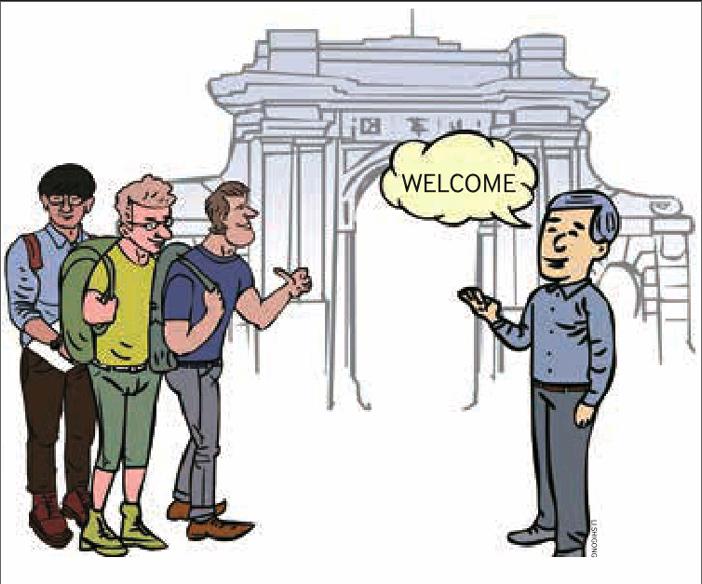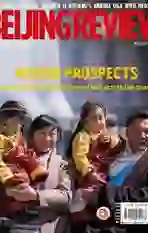Can Tsinghua Attract More International Talents by Waiving Written Exams?
2017-04-13

The prestigious Tsinghua University has recently released a new set of admission requirements for international students, which exempts foreigners who want to study for a bachelors degree at the university from all written entrance examinations except for an HSK Chinese profi ciency test.
Tsinghua is one of the nations most inaccessible universities. Only the few dozen students from each province who come out on top in the annual college entrance examination can be admitted.
Some people therefore feel the preferential treatment of international students discriminates against students from China. They argue that the HSK test is just too simple compared with IELTS or TOEFL, English tests that Chinese students are required to take to study abroad. It is their belief that the best way for Tsinghua and other universities in China to attract international students is for them to become more academically competitive internationally, instead of entitling foreign applicants to special treatment.
In response, Tsinghua claims it has not lowered the enrollment threshold for international students, as it requires them to have high overall competence and bases assessment of their applications on more extensive criteria than those of domestic students. Also, the enrollment of international students will not squeeze the quota for domestic students.
Meanwhile, some people believe that by waiving written examinations, Tsinghua means to attract more international applicants so that it can select the best from a larger talent pool. They say the foreign student population at Tsinghua is proportionately much lower than at many prestigious universities worldwide, and the foreign student proportion is an important indicator of a universitys world-class status. Also, its unfair to impose Chinas model of university student enrollment on international students, who may not be brought up in such an examination-oriented education environment.
No discrimination involved
Xiong Bingqi (www.jfdaily.com): Tsinghuas low threshold for international students has nothing to do with “discrimination against Chinese students,” as some have argued. To build a world-class university, a certain proportion of international students is a must. Given that Tsinghuas proportion stands at only 5.8 percent compared to the 20-30 percent at prestigious universities like Harvard, Oxford and Cambridge, its important for Tsinghua to scale up enrollment of international students. If it does not do so, Tsinghua will never become one of the worlds best universities. When the public gets to see the real international competitiveness of Chinas universities, their doubts will disappear.
The fundamental way to attract excellent international students for Chinas universities is to strengthen their competitiveness. As more and more international students apply for higher education courses in China, admission thresholds will surely be raised.
Enrollment in Chinas universities almost totally depends on students college entrance examination results. Imposing this practice on international students would eliminate most of them, which in turn, would inevitably corrode the reputation of Chinas universities.
Wei Xianyong (www.rednet.cn): Tsinghuas new approach to foreign student enrollment is based on its actual needs. Current university evaluation standards require diversity among student nationalities. The harsh reality is that Chinas universities, except some in Hong Kong, are far less attractive than their Western counterparts. That may be the reason why Tsinghua has to cancel written examinations for international students. This practice will help to improve the universitys international influence and its position in world university rankings. In turn, this will encourage more excellent international students to apply to universities in China.
Sun Xiantao (china.cnr.cn): Statistics show that in 2016, more than 500,000 students from China went to study abroad, while more than 400,000 international students came to study in China. Apparently, the gap between outbound and inbound students is narrowing, but in fact, of the 400,000 students, only half enrolled in academic courses, while the remainder came for short-term training.
Chinas universities are still not attractive enough. As a bellwether of Chinas higher education, Tsinghua is obligated to set an example by attracting a larger number of excellent international students.
When recruiting overseas students, top universities in other countries adopt a process of online applications and interview appraisals. Why then cant Tsinghua do likewise to select outstanding international students?
Tangjiweide (pinglun.iqilu.com): The major channel for students in China to enter university is to pass the national college entrance examination. Though some can be admitted without taking the exam, they have to go through strict appraisal procedures. The limited quota makes this selection route no less fi ercely competitive than the college entrance examination.
In the age of globalization, students are increasingly gaining access to universities overseas. Of course, the methods for recruiting domestic and international students are different. When it comes to international students, Chinas universities are completely free to use international methods. Chinas education system essentially differs from those in many other countries by virtue of its emphasis on rote learning and exam results. Therefore, it could be argued that expecting international students to pass a test similar to Chinas college entrance examination is unrealistic.
Public skepticism of Tsinghuas new foreign student enrollment scheme stems from worry about education equality and dissatisfaction with existing unfairness in the diversifi ed methods of student enrollment. However, if people spent some time to understand other countriesapproaches toward foreign student enrollment, their dissatisfaction and doubt would diminish.
Lei Lei (www.youth.cn): The new enrollment policy toward international students by Tsinghua has raised doubts and even sparked criticism from the public. After all, domestic students chances of getting into Tsinghua, even if they study very hard and perform very well academically, are slim. What a striking contrast this is to waiving written examinations for international students!
However, some essential details of the universitys foreign student enrollment policy have been neglected or even distorted. Although they dont need to sit for written examinations, international students still have to pass the HSK test and are required to submit references. The university will assess foreign applicants on the basis of a comprehensive set of indicators rather than on written examination results. Thus, applicants overall competence will be emphasized.
This new approach can be seen as an innovation in Chinas university student enrollment and can enable Chinas higher learning institutions to attract excellent students.
The public concern focuses on limited excellent education resources being diverted from domestic students to international students, adding to the unfairness which already exists in the education system. However, the reality shows this worry is baseless. Tsinghuas enrollment of international students will be kept at the same level as in the past, and its domestic enrolment will remain at around 3,370 students a year. International students will not squeeze the number of places available for domestic undergraduates. Its worth noting that the equally prestigious Peking University has already been employing a similar assessment framework for foreign applicants for several years.
Tsinghua is adjusting its foreign student enrollment policy with a view to attracting international talent and enhancing its international influence. Prestigious universities like Harvard and Yale adopted similar application and approval systems long ago. Obviously, at a time when education resources are widely shared around the globe, some peoples anxiety is totally unnecessary.
Backing the wrong horse
Wang Xiangu (pinglun.eastday.com): Is Tsinghua really shortening the gap between itself and top Western universities by waiving written examinations for international students? Many Chinese students studying in Western universities say these schools require applicants to take strict written examinations aside from passing language profi ciency examinations.
Is it for fairness? Look at the millions of domestic students across the nation who come from underdeveloped regions but have to take the same test as others whove grown up in areas with much better education conditions. While the unfairness facing domestic students remains unresolved, Tsinghua is turning its attention to making admission fairer for international students. No wonder the public is griping about the university discriminating against domestic students.
We know that Tsinghua yearns to make itself a world-class university, but it should understand that recruiting a certain number of international students will not necessarily enable the university to achieve that goal. Higher learning institutions that are truly world-class achieve that status by virtue of their academic competence, rather than simply by attracting international students.
If Tsinghua is serious about becoming a top-level university, it should focus on strengthening itself academically. Lowering the threshold for international students not only incurs complaints from domestic students and their parents, but could also lead to less qualifi ed international students gaining admission.
